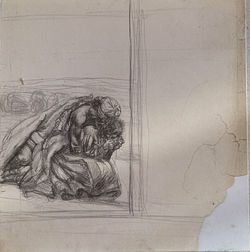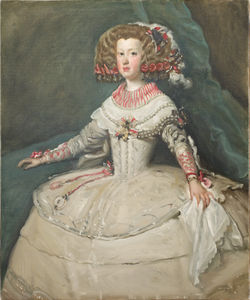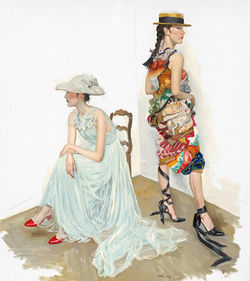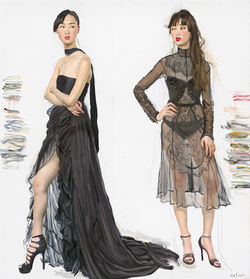Tang Contemporary Art proud to present the biggest solo exhibition by artist Chen Danqing ‘Step Back 1968 - 2019’ occupying both our Beijing spaces from 2 Nov to 28 Dec, 2019.
Curated by Cui Cancan. In riotous profusion of splendid paintings spanning over 50 years, the exhibition will feature 9 sections celebrating the abundant creative output by Chen Danqing, theming Soviet-Union Realism, Tibetan Series, Copying the Historical Paintings, Catalogues and Literatures, Sketches, Fashion Models, Workers and Farmers, Still Life, Variations of Self-portraiture.
The title “Regression” comes from Chen Danqing’s book A Collection of Regressions, and it is the primary narrative thread for the exhibition. Advancement and regression among the series serves as both an assumption and a metaphor for re-examining the changes in Chen’s paintings from 1968 to the present.
The exhibition is divided into several parts, beginning with the exercises of his youth. That section showcases Chen Danqing’s imitations of reproductions of European paintings in a loft in Shanghai. In the 1970s, Chen was a sent-down youth, and he made many life drawings and illustrations. It wasn’t until Tears Sprinkled Over a Bumper Crop that his vision of Soviet painting allowed him to shake off the dogma of the Cultural Revolution. In 1980, with the single-minded devotion and kindness of Tibetan Series, he washed away that second-hand Soviet influence, and his art once again returned to movements of life, marking a symbolic change in Chinese art history.
The next year, Chen Danqing went to New York. Broadening his horizons made him abandon his biases, and through imitation, he had a true experience of Western painting. In 1997, Chen began his new catalog series, returning to many years of imitation and realism. These works and his latest figure paintings are placed together. Politics, society, and stylistic concerns retreated from his work, along with Soviet, French, and classical painting techniques. Chen made the shift from a Cultural Revolution painter to an individual painter.
In this long process, we can see paintings, but we can also see the changes in the artist and his paintings as circumstances changed. In the end, when describing Chen Danqing, there has always been progression and regression. Revealing these changes and discussing these themes were the goal of curating this exhibition.
In Chen Danqing’s fifty-year artistic career, regression has had multiple meanings. On the one hand, it is a positive freedom that points to the active choices made in a personal mode of creation, showing what he continued and what he abandoned. Behind these choices, the artist actively responds to changes in his times and himself. On the other hand, this is also a negative freedom. Within the circumstances of painting today and a past that de-emphasized personal achievement, his art has returned to its early state. In several of Chen’s works from 1968, he did not have a clear style and he wasn’t preaching anything; they were just a young person’s first interests and passions. Today in particular, discussing progression and regression, together with these two types of freedom, seems particularly important.
 Self-portrait - 60 Years Old oil on canvas 138 x 92.5 cm 2014 |  Harvest Fields Flooded by Tears oil on canvas 120 x 200.3 cm 1976 |  Draft of "Returning in The Dusk" oil on canvas 59.5 x 45.1 cm 1981 |
|---|---|---|
 Draft of "Shepherd" oil on canvas 28 x 27.7 cm 1981 |  After Cézanne oil on canvas 55 x 71 cm 1987 |  After Diego Velázquez oil on canvas 61 x 51 cm 2014 |
 Ming Dynsaty Citizens and Rubens oil on canvas 76 x 202 cm 2015 |  Group Portrait of Florence Citizens oil on canvas 199.4 x 199.6 cm 2017 |  Princess and The Maid oil on canvas 137 x 188 cm 2008 |
 Colourful Clothing and Muslin Dress oil on canvas 180 x 160 cm 2017 |  White Shirts oil on canvas 210 x 230 cm 2017 |  At Ease oil on canvas 180 x 160 cm 2017 |
 Artificial Flowers oil on canvas 210 x 230 cm 2017 |  Red Suit oil on canvas 210 x 230 cm 2017 |  Blue Sofa oil on canvas 180 x 160 cm 2017 |

Chen Danqing
b. 1953 Shanghai, China
Chen Danqing is an American-Chinese painter known for his realist depictions of nudes and rugged landscapes. Influenced by the paintings of Jean-François Millet, Chen empathetically portrayed Tibetan farmers and herdsman, drawing criticism from the Communist regime during the 1980s.
Born on August 11, 1953 in Shanghai, China, he created propaganda art as teenager depicting the feats of Mao Zedong. Chen went on to enroll at the Central Academy of Fine Arts in Beijing. In 1982, the artist immigrated to the United States, where he spent the next 18 years writing and painting in New York. During his time in New York, Chen befriended fellow artist and activist Ai Weiwei. In 2000, he returned to China, and became an outspoken critic against the state. Ai and Chen published the book Interviews Not About Art in 2007.
With the long lost humanity and strong personality, Chen Danqing, unlike many contemporary Chinese intellects, dares to question the social reality, and reflects and criticizes many social events with a senesce of detachment that should have been possessed by an intellect. He is awarded the prizes for “The Fifty Public Intellectuals Who Have Influenced China”, “2005 Top Ten Male Elites in China”, “Elites of the Era”, etc..

Curator: Cui Cancan
Cui Cancan is an independent curator in China, he has won Chinese Contemporary Art Award Critic Award, Yi Shu Award for Critical Writing etc., curated main exhibitions like Hei Qiao Night Way (2013), Xiang Cun Xi jian Chui (2013), FUCKOFF II (2013), Unlived by What is Seen (2014), Between the 5th and 6th Ring Road in Beijing (2015), The Decameron (2016), Curated solo exhibitions like Ai Weiwei, Xia Xiaowan, Shen Shaomin, Wang Qingsong, He Yunchang, Xiao Yu, Qin Ga, Xie Nanxing, Shi Jinsong, Li Zhanyang, Xu Zhongmin, Ma Ke, Xia xing, Zhao Zhao, Li Qing, Chen Yufan, Chen Yujun, Li Binyuan, Feng Lin, Zhang Yue, Zong Ning, Jiang Bo etc.
Inquire about this exhibition

